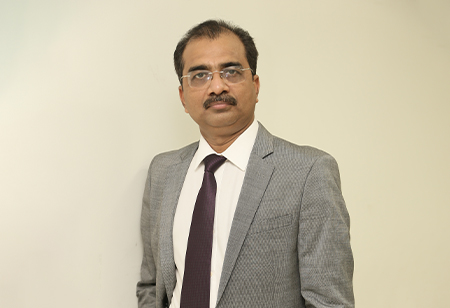 Magazine
Magazine

Biju Balendran, a seasoned professional, boasts a rich history of steering manufacturing plant operations for eminent OEMs like Hyundai, Renault, and Nissan. His leadership drives enhancements across production lines, harnessing smart manufacturing methodologies. Armed with a BE in Electrical and Electronic Engineering from the National Institute of Technology Karnataka, his expertise optimizes efficacy and operational excellence in complex industrial settings. In a recent interaction with Thiruamuthan (Correspondent, Industry Outlook), Biju discussed India's automotive manufacturing sector, focusing on industry-specific sustainable initiatives. He highlighted key sustainability practices, technological innovations, and financial strategies aimed at promoting sustainability.
How has the global automotive manufacturing industry undertaken substantial environmental improvements over the past decade?
With the rapid progression of technology and shifting global dynamics, the manufacturing sector is undergoing profound transformations. In 2024, the manufacturing industry will prioritize several key areas, such as:
Protecting the environment and resources: The industry will place heightened importance on safeguarding the environment and resources. This entails a focus on the entire product life cycle, embracing circular economy principles, and minimizing waste throughout the complete manufacturing process.
Improving efficiency of operation: Manufacturers will strive to improve operational efficiency through the implementation of lean manufacturing principles and the integration of smart factories. Digital twining tools, real-time data analysis for bottleneck identification, and the deployment of advanced sensors, cameras, robotics, AR/VR, and other emerging innovations will be leveraged to eliminate human errors.
Quality-Centric Approach: A paramount emphasis will be placed on quality, ensuring the production of first-time-right products and delivering ultimate customer delight. Quality focus will extend beyond the manufacturing process to encompass complete process chains, commencing from raw material selection and processing, logistics, packaging, and digitized inspection and analysis, culminating in the final quality experience at the customer receiving point.
The purchasing decision will no longer solely revolve around price sensitivity; rather, it will also encompass considerations of quality and the utilization of environmentally friendly materials. This shift signifies a transformative era where customers demand not only cost-effectiveness but also uphold a commitment to quality and environmental sustainability.
What innovative, sustainable materials and state-of-the-art manufacturing techniques are being embraced by industry leaders on a global scale?
"Sustainability" is the buzzword in the industry. We center our product development approach on sustainability, with a key focus on eliminating waste, reducing air and water pollution, and regenerating natural resources. The goal is to boost economic growth without compromising our planet's environment.
We prioritize creating jobs while ensuring our workforce's welfare, health, safety, and ergonomics. Our commitment extends to implementing a robust manufacturing system that assesses the environmental consequences of a circular economy strategy throughout all life cycle phases. In line with our commitment to sustainability, our business operations will increasingly use environmentally friendly materials.
We also implement lean management principles to optimize our processes, further contributing to our overall sustainability efforts. This integrated approach reflects our dedication to responsible business practices that not only benefit our operations but also contribute positively to the environment and society.
Can you elucidate the strategic coordination of industry-wide initiatives aimed at infusing sustainability throughout the complex automotive supply chain?
The complete cycle chain, starting from the supply of raw materials to the suppliers, the manufacturing of parts and products, and the distribution of goods to consumers, forms the complex automotive supply chain. This is very critical to ensuring the manufacturing facility gets the right parts at the right time to deliver the right cars to the customers. By adopting the right supply chain planning strategy using historical data, inventory management, and market intelligence data to understand changing demand, manufacturers can optimize or reduce costs, improve customer service, and support business goals.
Another area of focus is getting ahead on the journey towards carbon neutrality and achieving sustainability across different segments of automotive logistics. The automotive supply chain has become significantly more globalized, meaning that it is becoming difficult to keep track of where all of the materials are coming from. Hence, modern auto manufacturers work towards increasingly open and visible IT environments, with increased integration across the complete value stream.
How do financial strategies contribute to the advancement of sustainability in the global automotive manufacturing industry?
If we can find a way to streamline the production of our product, then we can decrease our warehousing needs, thereby reducing our logistics, resulting in a reduction of our overall carbon footprint by consuming fewer resources. By analyzing and optimizing the packaging, we can improve the fill rate of containers and trucks, thereby improving profit and supporting sustainability. This is a continuous improvement activity in every auto industry.
What's propelling the automotive industry towards a circular economy?
A circular economy refers to the process by which we preserve value in the form of energy, labor, and raw materials. Hence, the products are designed while considering durability, reuse, remanufacturing, and recycling to keep products, components, and materials circulating in the economy. Manufacturers implement a robust system to evaluate the environmental consequences of a circular economy strategy across all life cycle phases. The sustainable manufacturing approach considers the material and energy balances and analyzes any benefits that could be achieved by adopting alternative approaches to reach the same or better objective.
Some of the factors propelling the automotive industry towards a circular economy are:
Additionally, in order to move towards a low-carbon economy, governments also encourage more efficient use of resources and more sustainable consumption and production patterns through the implementation of various new regulations.
We use cookies to ensure you get the best experience on our website. Read more...